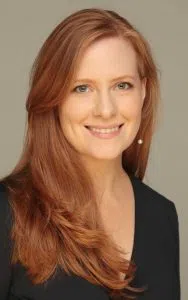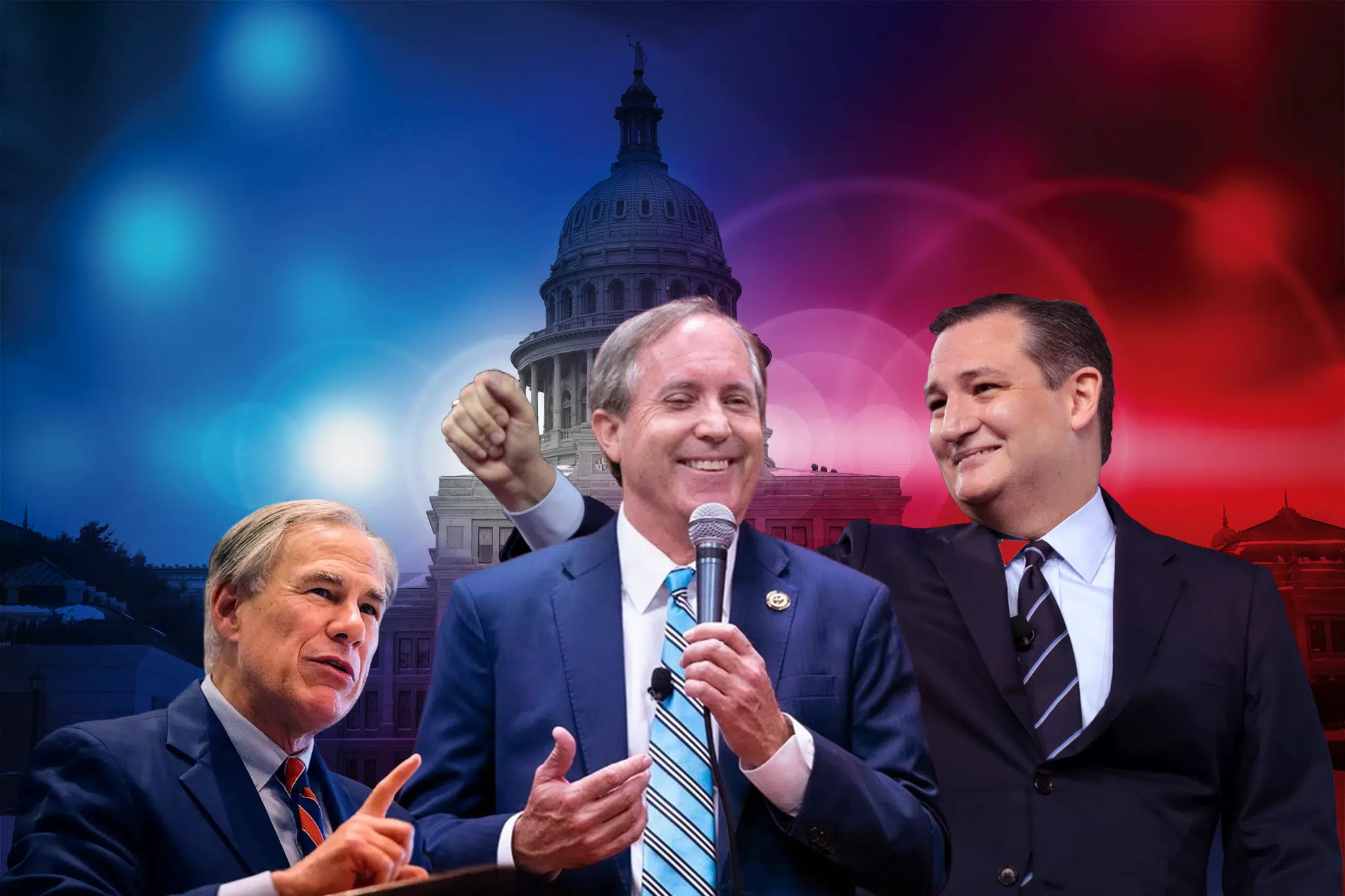Upacking ‘The Big Lie’ with the Houston Chronicle’s Lisa Falkenberg
(Seguin) — It all started with a single headline: “Editorial: Resign Senator Cruz. Your lies cost lives ––” An inflammatory statement, to say the least.
Throughout six more editorials, Seguin native Lisa Falkenberg and the rest of the Houston Chronicle’s editorial board made the case that widespread voter fraud, as portrayed by state leadership, was false.

Houston Chronicle Columnist Lisa Falkenberg, June 2015, in Houston TX. (Billy Smith II/ Houston Chronicle)
“There were allegations made that the 2020 presidential election was somehow stolen or rigged because of voter fraud,” Falkenberg said. “These allegations were made despite the fact that the department of homeland security found the election the most secure in American history. Some people chose not to believe that. In Texas, we figured this is a state where our leaders, including our Attorney General Ken Paxton and our governor Greg Abbott, dating back to when he was Attorney General, have tried harder than any other state, just about, to find voter fraud. They’ve spent millions in taxpayer money trying to find it, so if it exists, if it is common, if it is a serious problem that is eroding and attacking our democracy, well….hell, it should be here in Texas.”
The team’s series was called “The Big Lie,” and is the 2022 Pulitzer Prize winner for editorial writing.
Editorials are not news –– not exactly. They are opinion pieces written to persuade readers to either think the same way or consider a different viewpoint –– a lot of what passes for news in today’s corporate media is, in fact, editorial-style content. Moreover, journalism has a variety of categories in which a piece may fit –– this story, for instance, is a feature.
An editorial is not talking-head style commentary based on personal opinion or anecdote –– as with all real journalism, it must be thoroughly researched and, more importantly –– verified. Falkenberg, however, understands why some would be skeptical.
“My parents, when I called them –– some of your listeners may relate to my mother’s response,” Falkenberg said. “She is one of those folks who is somewhat skeptical, shall we say, of the idea that voter fraud isn’t as common as its being portrayed by a former president or by Fox News. So, I understand people’s doubts and skepticism because my own parents hold it.”
The Lone Star State has a reputation for being unshakably red with values that run deep through its history. Texas has proudly produced multiple US presidents throughout the years, but following the 2020 election, the Chronicle’s editorial board noticed a change. Bold and concerning claims about the prevalence of voter fraud in the state were being utilized in an effort to influence policy.
So, they did what journalists do –– they asked questions and found answers.
“Leaders in Texas, Republican leaders mostly, who felt that if they could say there was voter fraud going on, then they could limit access to the ballot,” Falkenberg said. “Which does help Republicans in large part. Because if you limit the access to the ballot, often people without cars, people without a ride to the polls, older people, people of color for instance are not going to make it, and those votes won’t count. And if they had tended to vote Democratic, which they do, then those votes won’t be present.”
Social media, Falkenberg says, is to largely blame. Advertising and algorithms have disrupted the flow of information, creating echo chambers where if users don’t like an opinion…. they can simply hide it.
“I’m very troubled by the way social media limits our perspectives; I try very much to expose myself to all sorts of viewpoints and my parents, they help me do that when I come home,” she said. “They have certain perspectives that, you know, they learn on Fox News that I may not have been familiar with before, but I try to look at the facts. Sometimes they’ll raise something that I hadn’t considered. I’ll look it and up and I’ll see. Maybe there’s a kernel of truth to it, maybe its full-blown truth and then they’ve taught me something, but a lot of times its distorted information that is tailored to an audience that some people hoping to make money, have manipulated for their own gain. That’s really hard for me to know that’s going on in so many families across America –– that people can’t have conversations based on the same facts anymore.”
But the facts that Falkenberg and the team found were that, historically, when politicians in Texas have claimed voter fraud –– it’s been in an attempt to limit the vote of those that would vote against them.
So, does legitimate voter fraud occasionally happen? Yes, but the cases the Houston Chronicle’s research uncovered indicated most instances occurred for reasons far less sinister than what Texans had been led to believe. In fact, the actual numbers varied greatly from the descriptions provided by politicians, major news outlets, and social media.
“We looked at whatever prosecutions had taken place and found just negligible numbers, negligible percentage,” she said. “To the point where you’re more likely to be struck, probably twice, by lightning than you are to commit voter fraud.”
With conversations increasing in the state regarding gerrymandering, voter restrictions, and more, it’s critical, Falkenberg says, for voters to know the truth.
She just hopes that the actual truth, based on verifiable facts, can get to those who need to read it the most.
“One thing I said the day the Pulitzer was announced is that my greatest hope is that the award and the attention that often surrounds it would increase the probability that the Texas leaders who truly needed to read our series about voter suppression would actually read it,” Falkenberg said. “If I were a betting woman, I would not place a bet that Ted Cruz is suddenly going to pick up the Houston Chronicle or the Pulitzer website and read the entry in full. But I do hope that honest, skeptical, curious, patriotic Americans who want to know the truth about whether voter fraud exists and whether it’s a problem will go to the Pulitzer site and look at the Editorial Writing entry and read some of our series. We’ve tried to write it in such a way that lays out all the facts.”
In a world where social media and extremism have often made factual statements a subjective thing, people on both sides of the great American political divide may be wondering if there is any hope left and, if so, where they can find some of it.
“Do I believe there is hope for this democracy and this country? Yes, I do,” Falkenberg said. “That hope, rests in the leaders who can be honest and principled and just simply have integrity despite all of the pressures they may have from their own groups to manipulate a narrative or join forces with somebody who will help them get re-elected. And my hope, because I’m a journalist, largely rests in journalism. The Washington Post has this slogan that all of us know and I love, ‘democracy dies in darkness,’ and it is true. Without fair and accurate journalism –– that is actually fair and accurate –– there will be no democracy because democracy is based on the will of the people, and how can the people make the informed decisions they need to make if they’re not informed?”
Journalism originated in this country to be a watchdog for the people –– to make sure citizens knew what the government was doing and was expected to be critical of power structures when needed. It’s how the American Revolution happened. Before social media, there’s no way the publisher of our country’s first newspaper could have imagined the world of constant media onslaught Americans would find themselves living in nearly 250 years later.
Today’s journalists seeking to do the same truth-telling are often cast as instigators and, worse, liars with an agenda.
“I hope that my people in Seguin, my neighbors, my former teachers, my family members, and a town I love dearly will understand that the project was done with no other intention but to support our democracy,” Falkenberg said. “To tell the truth –– to let people know that their votes are safeguarded, that there are processes in Texas to make sure that voter fraud doesn’t happen, and by God if it does, our Attorney General is ready and willing to prosecute those. But it’s just not happening in the way that some leaders want people to believe.”
With a governor’s race looming in the distance, and local elections entering runoffs, Falkenberg hopes that voters will stay critical of all elected leaders and keep seeking out accurate information. The truth is still out there, and so are real journalists.
To read “The Big Lie” series for free, visit the Pulitzer website at www.pulitzer.org.





